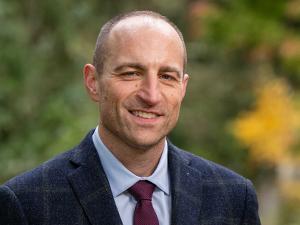
Jesse Abdenour
Biography
Jesse Abdenour (Ph.D., University of North Carolina at Chapel Hill) is an associate professor in the School of Journalism and Communication.
His research focuses on the production of quality nonfiction information and how it can be effectively communicated to audiences. Abdenour is interested in the entire path of communication, including the elements that constitute quality nonfiction messages, how these messages are produced, the ways in which consumers process such content, and how message quality can be maintained in the face of financial, institutional, and governmental challenges.
Abdenour is a leading researcher in the field of investigative journalism. He provided the first comprehensive analysis of investigative reporting at U.S. local television stations by developing a quantifiable definition of investigative news quality (Abdenour, 2018) and showed widespread evidence that high-quality investigative television reporting can increase audiences (Abdenour & Riffe, 2019).
His present work examines how ownership affects news quality and how nonfiction content can impact trust and message efficacy. Abdenour and colleagues were the first to show empirically that high-quality and engaging journalism stories can increase audience trust (Thier, Abdenour, Walth, & Dahmen, 2019). Abdenour explained the significance of these findings on a statewide Oregon radio program, Think Out Loud.
Abdenour has also examined journalists’ roles and social media use, news market competition, coverage of mass shootings, and the fair use of copyrighted material. His scholarly work draws from disciplines including communication, sociology, psychology, organizational theory and media law, and primarily employs quantitative methods such as content analysis, experiments, and surveys (see Abdenour’s Google Scholar profile for a complete list of papers).
A Seattle native, Abdenour worked in the Midwest and South for nine years as a television reporter, anchor, and videographer. He also produced several award-winning documentaries that appeared at film festivals across the country. His teaching interests include video production, reporting, documentary film, and quantitative research methods. Before coming to the University of Oregon, Abdenour taught communication classes at the University of North Carolina, Arkansas State University, and the University of Arkansas.
Education
- PhD, Mass Communication, University of North Carolina
- MA, Journalism, University of Arkansas
- BS, Journalism, Ohio University
Publications
[selected publications; please see Abdenour's Google Scholar profile for a complete list of papers]
Abdenour, J., McIntyre, K., & Dahmen, N. (2021). Seeing eye to eye: A comparison of audiences' and journalists' perceptions of professional roles and how they relate to trust. Journalism Practice, 15(3), 329-347. doi: 10.1080/17512786.2020.1716828
Thier, K., Abdenour, J., Dahmen, N., & Walth, B. (2019). A narrative solution: The relationship between solutions journalism, narrative transportation, and news trust. Journalism. Advance online publication. doi: 10.1177/1464884919876369
Abdenour, J. & Riffe, D. (2019). Digging for (ratings) gold: The connection between quality investigative journalism and audiences. Journalism Studies. 20(16), 2386-2403. doi: 10.1080/1461670X.2019.1598887
Hedding, K., Bane, K., Abdenour, J., & Blankenship, J. (2019). The Sinclair effect: Comparing ownership influences on bias in local TV news content. Journal of Broadcasting & Electronic Media. 63(3), 474-493. 10.1080/08838151.2019.1653103
Fuller, B. & Abdenour, J. (2019). It’s bigger than hip-hop: Sampling and the emergence of the market enhancement model in fair use case law. Journalism & Mass Communication Quarterly. 96(2), 598-622. doi: 10.1177/1077699018806969
Dahmen, N., Abdenour, J., & McIntyre, K. (2019). Covering mass shootings: Journalists’ perceptions of mass shooting coverage and factors influencing those perceptions. Journalism Practice. 13(8), 895-900. doi: 10.1080/17512786.2019.1642131
Abdenour, J. (2018). Study: Competition between TV stations spurs investigative journalism. Columbia Journalism Review. https://www.cjr.org/analysis/study-competition-between-tv-stations-spurs-investigative-journalism.php
McIntyre, K., Dahmen, N. & Abdenour, J. (2018). The Contextualist Function: U.S. Newspaper Journalists Value Social Responsibility. Journalism. 19(12), 1657-1675. doi: 10.1177/1464884916683553
Abdenour, J. (2018). Inspecting the investigators: An analysis of television investigative journalism and factors leading to its production. Journalism & Mass Communication Quarterly.95(4), 1058-1078. doi: 10.1177/1077699017733438
Riffe, D. & Abdenour, J. (2017). “Erosion” of television city hall reporting? Perceptions of reporters on the beat in 2014 and 2001. Journalism & Mass Communication Quarterly. 94(4), 1096-1114. doi: 10.1177/1077699016654683
Abdenour, J. (2017). Digital Gumshoes: Investigative Journalists’ Use of Social Media in Television News Reporting. Digital Journalism, 5(4), 472–492. doi: 10.1080/21670811.2016.1175312
Honors and Awards:
Association for Education in Journalism and Mass Communication
- Top Faculty Paper Award, Newspaper and Online Division, Association for Education in Journalism and Mass Communication Conference, 2016
National Academy of Television Arts & Sciences
- Best Non-News Program/Documentary, Mid-America Emmy Awards, 2011
- Best Non-News Program/Documentary, Mid-America Emmy Awards, 2010
Areas of Expertise:
- Journalism Studies
- News Quality
- News Audiences
- Documentary Film
- Investigative Journalism
- Broadcast Journalism
- Copyright Law
